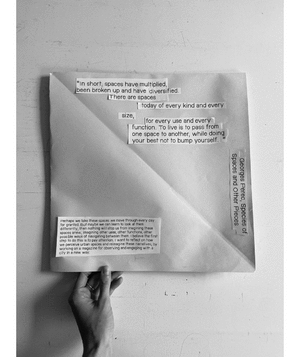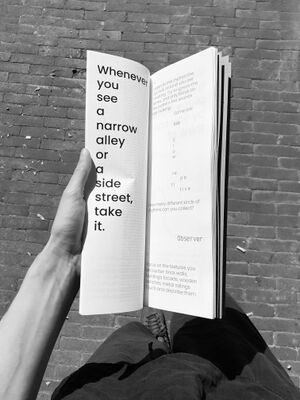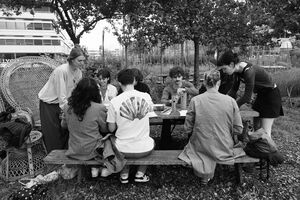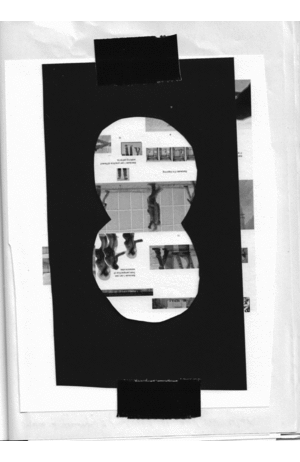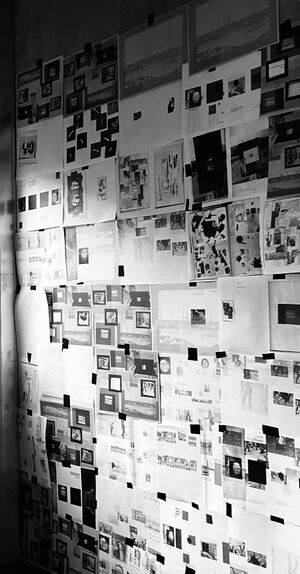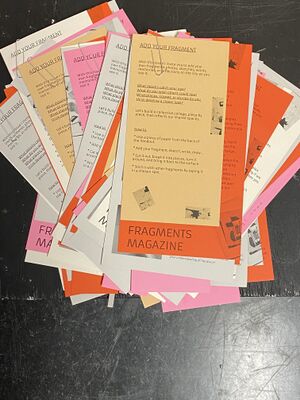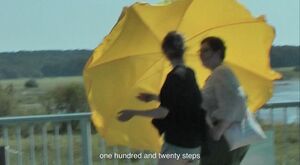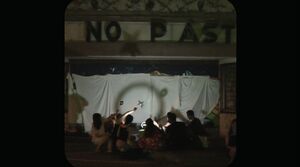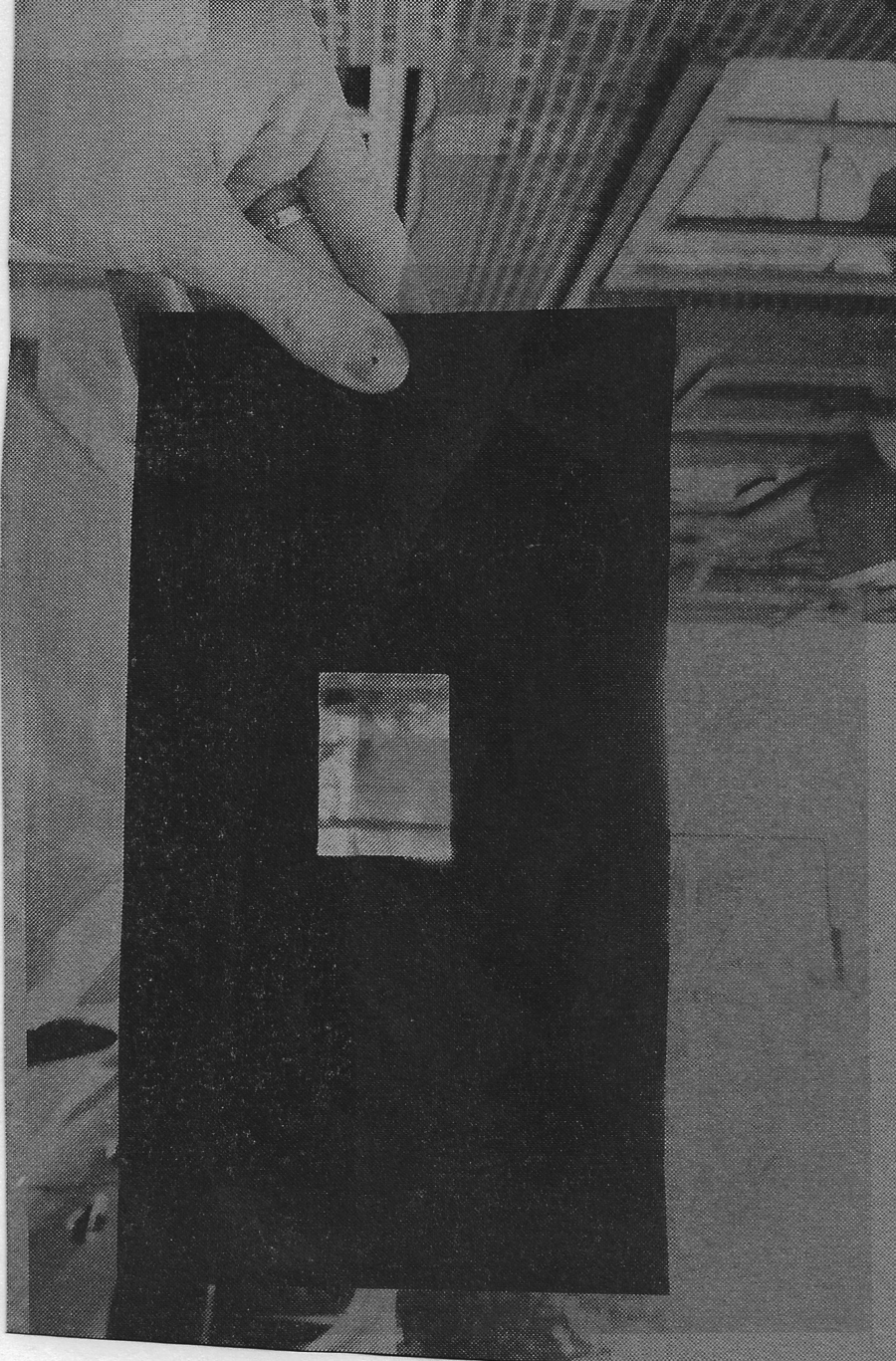User:Mania/Project Proposal: Difference between revisions
| (104 intermediate revisions by 2 users not shown) | |||
| Line 5: | Line 5: | ||
__TOC__ | __TOC__ | ||
==Project proposal== | |||
'''What do you want to make?''' | |||
My final project will be a magazine (Fragments Magazine) that actively engages readers in experiencing and reinterpreting the spaces they inhabit. What makes Fragments a magazine is its collaborative approach, utilizing workshops to create content, which outcomes are meant to invite performative interactions with space. I want to understand how a magazine that is meant to be read or even played outside can influence the way we perceive our surroundings. Therefore Fragments magazine is a repository for paper-based tools that redefines what a magazine is commonly understood to be. By actively existing in public space, it becomes an interface for specific actions and experiences, rather than just a container. | |||
[[File: | [[File:Kite.gif|thumb|chapter of my thesis unfolding into a kite]] | ||
'''Relation to previous practice''' | |||
[[File:Scriptstoreadthtcity-relation.jpg|thumb|left|Guide - part of Scripts to read the city]] | |||
[[File:Scriptstoreadthtcity-relation2.jpg|thumb|left|workshop - part of Scripts to read the city ]] | |||
Fragments Magazine will build upon the experience gained in previous semesters. Starting with the research into neighborhoods as learning environments, which I began in the second semester and drawing heavily from the last Special Issue. Fragments Magazine continues the exploration of the theme undertaken during the Scripts to Read the City project, where I tried to create a series of scripts that encourage spontaneous behavior and exploration of space. The result of the work was a device for reading the city and a guide containing scripts that encourage the discovery of opportunities we might encounter and the viewing of the city from someone else’s perspective. Additionally, as part of the project we conducted a series of workshops in which participants wrote their own scripts, and then we walked around the city according to a script written by someone else. | |||
For the magazine I utilize the exploration of the relationship between scripted and spontaneous behaviour, the tension between chance and control, and how the simple tool or a script can enhance unpredictability, stimulate imagination and encourage us to observe space with curiosity, as if we were looking from someone else's perspective. Treating this as a foundation, I want to experiment more with printed matter, forming scripts and playing with the physicality of paper, to understand how a magazine can shape the way we perceive our surroundings. This project studies how even the simplest tools, which impose certain limitations, can open us to unexpected opportunities and seeing our surroundings in a new way. It considers magazines as shared resources that help us observe, see differently, and encourage us to question reality. I want to explore the role that self-publishing and distribution might play in this context, by thinking about ways I’ll publish my project to create networks of exchange. | |||
'''How do you plan to make it?''' | |||
[[File:Notebook.gif|thumb|fragments from my notebook]] | |||
With the magazine I aim to create a space for chance, surprises and change. It takes a fragment as a starting point for sharing, layering, reconstructing, embracing multiple perspectives to envision different ways of seeing and engaging with our direct environments. | |||
I started experimenting by fragmenting what I see on my street to bring certain things to the surface. I began doing this intuitively, arranging pieces into collages. I continued with both image and text, trying to see how isolating certain details changes the understanding of the place. What stories do these fragments tell? Collage and playing with paper come to me intuitively—I even do it for relaxation—but conceptually, something intrigues me about the idea of looking at a city piece by piece. I think we only ever see fragments, and no image of a city is ever complete. It’s this uncovering bit by bit, discovering something unexpected, that excites me about wandering around the city without a plan, without a goal, just seeing what reveals itself to me. | |||
Moreover, fragments offer the possibility of connecting them with other fragments, or cutting them into even smaller pieces and turning them into something else. Rearranging them, bringing certain elements to the forefront, gives me a lot of room to reimagine certain things and also to invite others to do this together with me. | |||
The way I want to test some of the formats and ideas but also gain knowledge is through giving and participating in workshops. I’m planning to organise a zine making workshop in De Boog, where each participant adds or removes one element and scans a new page, its to test how to make a publication that doesnt just depict the surroundings but engages readers in reinterprating them. I want to use my coloqium as an oppurtnity to test paper based tools. Another method could be a group walk, followed by a conversation to share insights, or handing tools from person to person and changing their instructions to discover a different scenario. | |||
I’m planning to dive deeper into situationists approach in order to find methods for playful encounters and interventions to design format for the magazine to exist also outside. | |||
An important part of my practice is experiment with print, for this project I want to explore web to print. | |||
[[File:Public moment.jpg|thumb|public moment]] | |||
[[File:Public moment2.jpg|thumb|instructions to add your own fragment to the collective collage]] | |||
'''Why do you want to make it?''' | |||
Everyone is saying to do what excites you. Well, what excites me is working with printed matter. I’m obsessed with Riso printing, and I really enjoy working on publications. I'm curious to explore what a magazine could be if I think of it as something to be read outdoors or used as a tool, and what it could bring to urban spaces. After completing the Scripts to Read the City project, I find the question of what perspectives artistic research can bring to urban spaces very relevant. I love cities and I am interested in projects rooted in this context. | |||
This summer, I attended a summer school focused on urban space as a place for various (un)learning practices, activating different modes of knowing, sensing, and being/becoming together. I met people from urban studies, researchers, and other artists interested in participatory urban interventions, and I think that these connections could also help me now, by providing constructive conversations. | |||
I want to combine the topic of urban space with the format I love—publications, specifically a magazine. I feel that with this format, I’ll be able to continue this project even after graduation. I want this project to bring me closer to zine festivals, other zine makers, and printed matter enthusiasts. At the same time, I really want to create a website, even though I’m terribly stressed that I’m not very skilled at it. Still, I think exploring web to print would be a way to experiment with the format of the magazine and how code could strengthen my work. | |||
[[File:Stillfromvideo.jpg|thumb|center|stills from my short film]] | |||
[[File:Previouspracticeimage2.jpg|thumb|center|performace in public space - stills from my short film]] | |||
'''Who can help you and how?'''
| |||
I can definitely count on the people from De Boog—they’re also interested in print and always look for ways to do things together. I’m planning to run a workshop there, and their help will be very valuable. I think that if I go forward with an open call for the magazine, participants I met during the Viadrinicum summer school might be interested in taking part in it. I just thought of reaching out to some of them to conduct short interviews, which could accually be incredibly inspiring for finding the right approach to public space interventions in terms of ways to publish the magazine. Other than that I really need help from tutors to master web-to-print. And most importantly some emotional support from other students and friends. | |||
[[File:Cutots2 1.png|left|thumb|1367x1367px]] | |||
'''What is your time table?'''
<blockquote>'''September:''' | |||
''' | |||
- continuation of the project Scripts to read the city, leading workshop in Groningen | |||
'''October:''' | |||
- Experiments with camera obscura, paper frame, photographs and collages, fragmenting | |||
''' | '''November:''' | ||
* Participating in zine fest in Amsterdam, showing zines in the process | |||
* Public moment | |||
* Coloqium - testing workshop format 1 | |||
* Finalizing project proposal and research outline | |||
* Start with the website draft | |||
* Experiment with the formats of the magazine to exist outside | |||
'''December''' | |||
* Assesment | |||
* Website continuation - Find a way exaclty how I envision the website and its structure | |||
'''January''' | |||
* Workshop 2 - De Boog | |||
* Website draft | |||
'''February''' | |||
*Workshop 3 - De Boog | |||
* Collect materials from all the workshops | |||
'''March''' | |||
* Adding collected material to the website | |||
'''April''' | |||
- magazine design | |||
'''May''' | |||
- magazine production | |||
'''June''' | |||
- activating the magazine by playing it outside | |||
- documentation </blockquote> | |||
'''References:''' | |||
Johanathan Crary, Techniques of the Observer Georges Perec, Species of Spaces and Other Pieces Guy Debord, Report on the Construction of Situations(1957) The Situationist International (SI) - Situationist maps, like The Naked City (1957), fragment Paris into emotional zones, challenging the conventional ways cities are navigated and understood. Soda Kazhiro, Why I make documentaries, on observational filmmaking Kevin Lynch, The image of the city Italo Calvino, Invisible Cities Rebecca Solnit, Infinite City: A San Francisco Atlas (2010) Jane Jacobs , The Death and Life of Great American Cities (1961) - Jacobs emphasized the importance of "eyes on the street" and mixed-use urban areas, critiquing large-scale modernist urban planning in favor of organic, community-oriented design. Dziga Vertov – Man with a Movie Camera (1929) Agnes Varda – Daguerreotypes (1976) Frederick Wiseman – In Jackson Heights (2015) Jean-Luc Godard – Alphaville (1965) | |||
Latest revision as of 00:29, 22 November 2024
Project proposal
What do you want to make?
My final project will be a magazine (Fragments Magazine) that actively engages readers in experiencing and reinterpreting the spaces they inhabit. What makes Fragments a magazine is its collaborative approach, utilizing workshops to create content, which outcomes are meant to invite performative interactions with space. I want to understand how a magazine that is meant to be read or even played outside can influence the way we perceive our surroundings. Therefore Fragments magazine is a repository for paper-based tools that redefines what a magazine is commonly understood to be. By actively existing in public space, it becomes an interface for specific actions and experiences, rather than just a container.
Relation to previous practice
Fragments Magazine will build upon the experience gained in previous semesters. Starting with the research into neighborhoods as learning environments, which I began in the second semester and drawing heavily from the last Special Issue. Fragments Magazine continues the exploration of the theme undertaken during the Scripts to Read the City project, where I tried to create a series of scripts that encourage spontaneous behavior and exploration of space. The result of the work was a device for reading the city and a guide containing scripts that encourage the discovery of opportunities we might encounter and the viewing of the city from someone else’s perspective. Additionally, as part of the project we conducted a series of workshops in which participants wrote their own scripts, and then we walked around the city according to a script written by someone else. For the magazine I utilize the exploration of the relationship between scripted and spontaneous behaviour, the tension between chance and control, and how the simple tool or a script can enhance unpredictability, stimulate imagination and encourage us to observe space with curiosity, as if we were looking from someone else's perspective. Treating this as a foundation, I want to experiment more with printed matter, forming scripts and playing with the physicality of paper, to understand how a magazine can shape the way we perceive our surroundings. This project studies how even the simplest tools, which impose certain limitations, can open us to unexpected opportunities and seeing our surroundings in a new way. It considers magazines as shared resources that help us observe, see differently, and encourage us to question reality. I want to explore the role that self-publishing and distribution might play in this context, by thinking about ways I’ll publish my project to create networks of exchange.
How do you plan to make it?
With the magazine I aim to create a space for chance, surprises and change. It takes a fragment as a starting point for sharing, layering, reconstructing, embracing multiple perspectives to envision different ways of seeing and engaging with our direct environments. I started experimenting by fragmenting what I see on my street to bring certain things to the surface. I began doing this intuitively, arranging pieces into collages. I continued with both image and text, trying to see how isolating certain details changes the understanding of the place. What stories do these fragments tell? Collage and playing with paper come to me intuitively—I even do it for relaxation—but conceptually, something intrigues me about the idea of looking at a city piece by piece. I think we only ever see fragments, and no image of a city is ever complete. It’s this uncovering bit by bit, discovering something unexpected, that excites me about wandering around the city without a plan, without a goal, just seeing what reveals itself to me. Moreover, fragments offer the possibility of connecting them with other fragments, or cutting them into even smaller pieces and turning them into something else. Rearranging them, bringing certain elements to the forefront, gives me a lot of room to reimagine certain things and also to invite others to do this together with me. The way I want to test some of the formats and ideas but also gain knowledge is through giving and participating in workshops. I’m planning to organise a zine making workshop in De Boog, where each participant adds or removes one element and scans a new page, its to test how to make a publication that doesnt just depict the surroundings but engages readers in reinterprating them. I want to use my coloqium as an oppurtnity to test paper based tools. Another method could be a group walk, followed by a conversation to share insights, or handing tools from person to person and changing their instructions to discover a different scenario. I’m planning to dive deeper into situationists approach in order to find methods for playful encounters and interventions to design format for the magazine to exist also outside. An important part of my practice is experiment with print, for this project I want to explore web to print.
Why do you want to make it?
Everyone is saying to do what excites you. Well, what excites me is working with printed matter. I’m obsessed with Riso printing, and I really enjoy working on publications. I'm curious to explore what a magazine could be if I think of it as something to be read outdoors or used as a tool, and what it could bring to urban spaces. After completing the Scripts to Read the City project, I find the question of what perspectives artistic research can bring to urban spaces very relevant. I love cities and I am interested in projects rooted in this context. This summer, I attended a summer school focused on urban space as a place for various (un)learning practices, activating different modes of knowing, sensing, and being/becoming together. I met people from urban studies, researchers, and other artists interested in participatory urban interventions, and I think that these connections could also help me now, by providing constructive conversations. I want to combine the topic of urban space with the format I love—publications, specifically a magazine. I feel that with this format, I’ll be able to continue this project even after graduation. I want this project to bring me closer to zine festivals, other zine makers, and printed matter enthusiasts. At the same time, I really want to create a website, even though I’m terribly stressed that I’m not very skilled at it. Still, I think exploring web to print would be a way to experiment with the format of the magazine and how code could strengthen my work.
Who can help you and how?
I can definitely count on the people from De Boog—they’re also interested in print and always look for ways to do things together. I’m planning to run a workshop there, and their help will be very valuable. I think that if I go forward with an open call for the magazine, participants I met during the Viadrinicum summer school might be interested in taking part in it. I just thought of reaching out to some of them to conduct short interviews, which could accually be incredibly inspiring for finding the right approach to public space interventions in terms of ways to publish the magazine. Other than that I really need help from tutors to master web-to-print. And most importantly some emotional support from other students and friends.
What is your time table?
September:
- continuation of the project Scripts to read the city, leading workshop in Groningen
October:
- Experiments with camera obscura, paper frame, photographs and collages, fragmenting
November:
- Participating in zine fest in Amsterdam, showing zines in the process
- Public moment
- Coloqium - testing workshop format 1
- Finalizing project proposal and research outline
- Start with the website draft
- Experiment with the formats of the magazine to exist outside
December
- Assesment
- Website continuation - Find a way exaclty how I envision the website and its structure
January
- Workshop 2 - De Boog
- Website draft
February
- Workshop 3 - De Boog
- Collect materials from all the workshops
March
- Adding collected material to the website
April
- magazine design
May
- magazine production
June
- activating the magazine by playing it outside
- documentation
References:
Johanathan Crary, Techniques of the Observer Georges Perec, Species of Spaces and Other Pieces Guy Debord, Report on the Construction of Situations(1957) The Situationist International (SI) - Situationist maps, like The Naked City (1957), fragment Paris into emotional zones, challenging the conventional ways cities are navigated and understood. Soda Kazhiro, Why I make documentaries, on observational filmmaking Kevin Lynch, The image of the city Italo Calvino, Invisible Cities Rebecca Solnit, Infinite City: A San Francisco Atlas (2010) Jane Jacobs , The Death and Life of Great American Cities (1961) - Jacobs emphasized the importance of "eyes on the street" and mixed-use urban areas, critiquing large-scale modernist urban planning in favor of organic, community-oriented design. Dziga Vertov – Man with a Movie Camera (1929) Agnes Varda – Daguerreotypes (1976) Frederick Wiseman – In Jackson Heights (2015) Jean-Luc Godard – Alphaville (1965)

